By Juan Carlos Donado · Thursday, April 18, 2013 Juan Carlos Donado’s “Chiasms in Meditation or Toward the Notion of Cartesian Fiction” appears in Telos 162 (Spring 2013). Read the full version online at the Telos Online website, or purchase a print copy of the issue in our store.
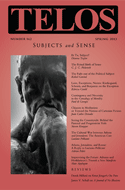 In constant friction with readings that are either completely oblivious of the notion or merely mention the fictional aspect of Descartes’ Meditations, this essay attempts to philosophically thematize the concept of fiction, based on a now famous interpretation by Michel Foucault. We will attempt to make a robust case for constructing the concept of Cartesian fiction as a philosophically crucial category, which cannot be absent from an analysis that pretends to capture the thrust of Descartes’ writing in the Meditations. We will address how fiction plays a determining role in defining certain philosophical pillars of Cartesian thought, such as the concepts of radical doubt, truth, and the extension of rationality itself. We will closely read various key moments of Meditations I–II to illustrate why fiction can be viewed as the hermeneutical catalyst that unlocks the interpretation of certain “chiasms,” which Foucault well identified within the Meditations as the crossing between two discursive lines, that of the system and that of the exercise. At the same time and by the same token, the focus on the concept of fiction will serve to provide our own interpretation of the meditating subject’s encounter with madness, an encounter that spurred a heated debate between Foucault and Jacques Derrida. In constant friction with readings that are either completely oblivious of the notion or merely mention the fictional aspect of Descartes’ Meditations, this essay attempts to philosophically thematize the concept of fiction, based on a now famous interpretation by Michel Foucault. We will attempt to make a robust case for constructing the concept of Cartesian fiction as a philosophically crucial category, which cannot be absent from an analysis that pretends to capture the thrust of Descartes’ writing in the Meditations. We will address how fiction plays a determining role in defining certain philosophical pillars of Cartesian thought, such as the concepts of radical doubt, truth, and the extension of rationality itself. We will closely read various key moments of Meditations I–II to illustrate why fiction can be viewed as the hermeneutical catalyst that unlocks the interpretation of certain “chiasms,” which Foucault well identified within the Meditations as the crossing between two discursive lines, that of the system and that of the exercise. At the same time and by the same token, the focus on the concept of fiction will serve to provide our own interpretation of the meditating subject’s encounter with madness, an encounter that spurred a heated debate between Foucault and Jacques Derrida.
Continue reading →
By Juan Carlos Donado · Friday, March 8, 2013 The following paper was presented at the Seventh Annual Telos Conference, held on February 15–17, 2013, in New York City.
 Much has certainly been said about the place of otherness in René Descartes’ Meditations on First Philosophy. But one could, or rather, should be more precise and determine that the majority of what has been said about otherness in Descartes’ opus magnum concerns an essential banishment of the other, not to call it an essential exclusion, at the face of the “I.” In a text that, as some would have it, inaugurates the age we call Modern and starting with its genre, critics have no problem directly drawing a line from the monological voice that gives rise to the Modern subject to the egocentricity that perhaps best characterizes an age in which the mechanization of Nature—if we are still to be called Moderns—is rapidly coinciding with its destruction. As if the question of genre in the Meditations were not one of extreme complexity, the monologue, or so the story goes, finally replaces dialogue as the genre of Modernity and the other, slowly fading away, loses its voice under the authoritarian submission to the monophonic first-person singular. Much has certainly been said about the place of otherness in René Descartes’ Meditations on First Philosophy. But one could, or rather, should be more precise and determine that the majority of what has been said about otherness in Descartes’ opus magnum concerns an essential banishment of the other, not to call it an essential exclusion, at the face of the “I.” In a text that, as some would have it, inaugurates the age we call Modern and starting with its genre, critics have no problem directly drawing a line from the monological voice that gives rise to the Modern subject to the egocentricity that perhaps best characterizes an age in which the mechanization of Nature—if we are still to be called Moderns—is rapidly coinciding with its destruction. As if the question of genre in the Meditations were not one of extreme complexity, the monologue, or so the story goes, finally replaces dialogue as the genre of Modernity and the other, slowly fading away, loses its voice under the authoritarian submission to the monophonic first-person singular.
Continue reading →
By Juan Carlos Donado · Tuesday, January 22, 2013 As an occasional feature on TELOSscope, we highlight a past Telos article whose critical insights continue to illuminate our thinking and challenge our assumptions. Today, Juan Carlos Donado looks at Carl Schmitt’s “The Age of Neutralizations and Depoliticizations,” from Telos 96 (Summer 1993).
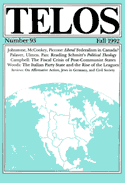 Perhaps Carl Schmitt would agree: more than ever before, we live today immersed within the spirit of technicity. Coined by Schmitt, the notion of the spirit of technicity serves the analytical purpose of allowing him to distinguish between the belief in technology and technology itself. Whereas technology signals the factual development of mechanistic progress and its link to natural science, the spirit of technicity, in Schmitt’s own words, is “perhaps an evil and demonic spirit, but not one which can be dismissed as mechanistic and attributed to technology” (141). Perhaps Carl Schmitt would agree: more than ever before, we live today immersed within the spirit of technicity. Coined by Schmitt, the notion of the spirit of technicity serves the analytical purpose of allowing him to distinguish between the belief in technology and technology itself. Whereas technology signals the factual development of mechanistic progress and its link to natural science, the spirit of technicity, in Schmitt’s own words, is “perhaps an evil and demonic spirit, but not one which can be dismissed as mechanistic and attributed to technology” (141).
Continue reading →
By Juan Carlos Donado · Wednesday, August 8, 2012 As an occasional feature on TELOSscope, we highlight a past Telos article whose critical insights continue to illuminate our thinking and challenge our assumptions. Today, Juan Carlos Donado looks at Heidegger’s 1933 letter to Carl Schmitt, published under the title “Heidegger and Schmitt: The Bottom Line” in Telos 72 (Summer 1987).
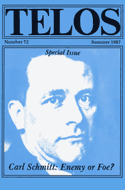 The date was August 22, 1933. Only ten days before, Winston Churchill had spoken publicly for the first time about the dangers of German re-armament. Almost exactly two months later, Germany would withdraw from the League of Nations. During that same year, Martin Heidegger would controversially speak in public about Hitler’s referendum, stating: “The National Socialist revolution is not merely the taking over of a present-at-hand power in the state by another power that has grown sufficiently [strong] for it, but rather this revolution brings the complete overturning [Umwälzung] of our German Dasein.” The date was August 22, 1933. Only ten days before, Winston Churchill had spoken publicly for the first time about the dangers of German re-armament. Almost exactly two months later, Germany would withdraw from the League of Nations. During that same year, Martin Heidegger would controversially speak in public about Hitler’s referendum, stating: “The National Socialist revolution is not merely the taking over of a present-at-hand power in the state by another power that has grown sufficiently [strong] for it, but rather this revolution brings the complete overturning [Umwälzung] of our German Dasein.”
Continue reading →
By Juan Carlos Donado · Wednesday, April 25, 2012 As an occasional feature on TELOSscope, we highlight a past Telos article whose critical insights continue to illuminate our thinking and challenge our assumptions. Today, Juan Carlos Donado looks at David Buxton’s “Rock Music, the Star-System and the Rise of Consumerism,” from Telos 57 (Fall 1983).
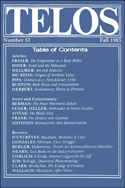 From its origin to its social significance, almost everything about rock and roll music remains steeped in fierce debate. Exactly when and where was it born? Who, if in fact there is one only, is rock’s founding figure? What exactly did it and does “rock and roll” mean? Although all of them amount to approximations, certain answers have become commonplaces: it was born with bluesman Robert Johnson, with Chuck Berry, with Jerry Lee Lewis, with Elvis Presley, in the Mississippi Delta, in Memphis, and its sound was crafted by means of the technological breakthrough of the electric guitar. It signifies the rebelliousness of a generation, the nonconformity of the young, the break with the status quo. Yet rock and roll’s relationship with capitalism cannot be more complex. From its origin to its social significance, almost everything about rock and roll music remains steeped in fierce debate. Exactly when and where was it born? Who, if in fact there is one only, is rock’s founding figure? What exactly did it and does “rock and roll” mean? Although all of them amount to approximations, certain answers have become commonplaces: it was born with bluesman Robert Johnson, with Chuck Berry, with Jerry Lee Lewis, with Elvis Presley, in the Mississippi Delta, in Memphis, and its sound was crafted by means of the technological breakthrough of the electric guitar. It signifies the rebelliousness of a generation, the nonconformity of the young, the break with the status quo. Yet rock and roll’s relationship with capitalism cannot be more complex.
Continue reading →
By Juan Carlos Donado · Thursday, March 15, 2012 As an occasional feature on TELOSscope, we highlight a past Telos article whose critical insights continue to illuminate our thinking and challenge our assumptions. Today, Juan Carlos Donado looks at Paul Piccone’s “Science, Art and Revolution: An Introduction to Galileo as a Poet,” from Telos 4 (Fall 1969).
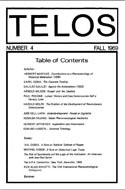 Even if Paul Piccone in fact mistakenly attributes the poem Contro Gli Aristotelici to Galileo—as scholars such as Charles B. Schmitt claim—the conclusion remains invariably the same. Piccone, of course, is not alone in this: the mistake originated in an early article written by the great Galilean scholar Antonio Favaro (1869–1922), responsible for the colossal twenty-volume edition of Galileo’s Opere. Favaro himself corrected the mistake one year later in a much lesser known article, but in print the attribution was already made and Jacopo Soldani’s satire, for years, was adopted by Galileo’s pen. Even if Paul Piccone in fact mistakenly attributes the poem Contro Gli Aristotelici to Galileo—as scholars such as Charles B. Schmitt claim—the conclusion remains invariably the same. Piccone, of course, is not alone in this: the mistake originated in an early article written by the great Galilean scholar Antonio Favaro (1869–1922), responsible for the colossal twenty-volume edition of Galileo’s Opere. Favaro himself corrected the mistake one year later in a much lesser known article, but in print the attribution was already made and Jacopo Soldani’s satire, for years, was adopted by Galileo’s pen.
Continue reading →
|
|
 In constant friction with readings that are either completely oblivious of the notion or merely mention the fictional aspect of Descartes’ Meditations, this essay attempts to philosophically thematize the concept of fiction, based on a now famous interpretation by Michel Foucault. We will attempt to make a robust case for constructing the concept of Cartesian fiction as a philosophically crucial category, which cannot be absent from an analysis that pretends to capture the thrust of Descartes’ writing in the Meditations. We will address how fiction plays a determining role in defining certain philosophical pillars of Cartesian thought, such as the concepts of radical doubt, truth, and the extension of rationality itself. We will closely read various key moments of Meditations I–II to illustrate why fiction can be viewed as the hermeneutical catalyst that unlocks the interpretation of certain “chiasms,” which Foucault well identified within the Meditations as the crossing between two discursive lines, that of the system and that of the exercise. At the same time and by the same token, the focus on the concept of fiction will serve to provide our own interpretation of the meditating subject’s encounter with madness, an encounter that spurred a heated debate between Foucault and Jacques Derrida.
In constant friction with readings that are either completely oblivious of the notion or merely mention the fictional aspect of Descartes’ Meditations, this essay attempts to philosophically thematize the concept of fiction, based on a now famous interpretation by Michel Foucault. We will attempt to make a robust case for constructing the concept of Cartesian fiction as a philosophically crucial category, which cannot be absent from an analysis that pretends to capture the thrust of Descartes’ writing in the Meditations. We will address how fiction plays a determining role in defining certain philosophical pillars of Cartesian thought, such as the concepts of radical doubt, truth, and the extension of rationality itself. We will closely read various key moments of Meditations I–II to illustrate why fiction can be viewed as the hermeneutical catalyst that unlocks the interpretation of certain “chiasms,” which Foucault well identified within the Meditations as the crossing between two discursive lines, that of the system and that of the exercise. At the same time and by the same token, the focus on the concept of fiction will serve to provide our own interpretation of the meditating subject’s encounter with madness, an encounter that spurred a heated debate between Foucault and Jacques Derrida.  Much has certainly been said about the place of otherness in René Descartes’ Meditations on First Philosophy. But one could, or rather, should be more precise and determine that the majority of what has been said about otherness in Descartes’ opus magnum concerns an essential banishment of the other, not to call it an essential exclusion, at the face of the “I.” In a text that, as some would have it, inaugurates the age we call Modern and starting with its genre, critics have no problem directly drawing a line from the monological voice that gives rise to the Modern subject to the egocentricity that perhaps best characterizes an age in which the mechanization of Nature—if we are still to be called Moderns—is rapidly coinciding with its destruction. As if the question of genre in the Meditations were not one of extreme complexity, the monologue, or so the story goes, finally replaces dialogue as the genre of Modernity and the other, slowly fading away, loses its voice under the authoritarian submission to the monophonic first-person singular.
Much has certainly been said about the place of otherness in René Descartes’ Meditations on First Philosophy. But one could, or rather, should be more precise and determine that the majority of what has been said about otherness in Descartes’ opus magnum concerns an essential banishment of the other, not to call it an essential exclusion, at the face of the “I.” In a text that, as some would have it, inaugurates the age we call Modern and starting with its genre, critics have no problem directly drawing a line from the monological voice that gives rise to the Modern subject to the egocentricity that perhaps best characterizes an age in which the mechanization of Nature—if we are still to be called Moderns—is rapidly coinciding with its destruction. As if the question of genre in the Meditations were not one of extreme complexity, the monologue, or so the story goes, finally replaces dialogue as the genre of Modernity and the other, slowly fading away, loses its voice under the authoritarian submission to the monophonic first-person singular.  Perhaps Carl Schmitt would agree: more than ever before, we live today immersed within the spirit of technicity. Coined by Schmitt, the notion of the spirit of technicity serves the analytical purpose of allowing him to distinguish between the belief in technology and technology itself. Whereas technology signals the factual development of mechanistic progress and its link to natural science, the spirit of technicity, in Schmitt’s own words, is “perhaps an evil and demonic spirit, but not one which can be dismissed as mechanistic and attributed to technology” (141).
Perhaps Carl Schmitt would agree: more than ever before, we live today immersed within the spirit of technicity. Coined by Schmitt, the notion of the spirit of technicity serves the analytical purpose of allowing him to distinguish between the belief in technology and technology itself. Whereas technology signals the factual development of mechanistic progress and its link to natural science, the spirit of technicity, in Schmitt’s own words, is “perhaps an evil and demonic spirit, but not one which can be dismissed as mechanistic and attributed to technology” (141).  The date was August 22, 1933. Only ten days before, Winston Churchill had spoken publicly for the first time about the dangers of German re-armament. Almost exactly two months later, Germany would withdraw from the League of Nations. During that same year, Martin Heidegger would controversially speak in public about Hitler’s referendum, stating: “The National Socialist revolution is not merely the taking over of a present-at-hand power in the state by another power that has grown sufficiently [strong] for it, but rather this revolution brings the complete overturning [Umwälzung] of our German Dasein.”
The date was August 22, 1933. Only ten days before, Winston Churchill had spoken publicly for the first time about the dangers of German re-armament. Almost exactly two months later, Germany would withdraw from the League of Nations. During that same year, Martin Heidegger would controversially speak in public about Hitler’s referendum, stating: “The National Socialist revolution is not merely the taking over of a present-at-hand power in the state by another power that has grown sufficiently [strong] for it, but rather this revolution brings the complete overturning [Umwälzung] of our German Dasein.”  From its origin to its social significance, almost everything about rock and roll music remains steeped in fierce debate. Exactly when and where was it born? Who, if in fact there is one only, is rock’s founding figure? What exactly did it and does “rock and roll” mean? Although all of them amount to approximations, certain answers have become commonplaces: it was born with bluesman Robert Johnson, with Chuck Berry, with Jerry Lee Lewis, with Elvis Presley, in the Mississippi Delta, in Memphis, and its sound was crafted by means of the technological breakthrough of the electric guitar. It signifies the rebelliousness of a generation, the nonconformity of the young, the break with the status quo. Yet rock and roll’s relationship with capitalism cannot be more complex.
From its origin to its social significance, almost everything about rock and roll music remains steeped in fierce debate. Exactly when and where was it born? Who, if in fact there is one only, is rock’s founding figure? What exactly did it and does “rock and roll” mean? Although all of them amount to approximations, certain answers have become commonplaces: it was born with bluesman Robert Johnson, with Chuck Berry, with Jerry Lee Lewis, with Elvis Presley, in the Mississippi Delta, in Memphis, and its sound was crafted by means of the technological breakthrough of the electric guitar. It signifies the rebelliousness of a generation, the nonconformity of the young, the break with the status quo. Yet rock and roll’s relationship with capitalism cannot be more complex.  Even if Paul Piccone in fact mistakenly attributes the poem Contro Gli Aristotelici to Galileo—as scholars such as Charles B. Schmitt claim—the conclusion remains invariably the same. Piccone, of course, is not alone in this: the mistake originated in an early article written by the great Galilean scholar Antonio Favaro (1869–1922), responsible for the colossal twenty-volume edition of Galileo’s Opere. Favaro himself corrected the mistake one year later in a much lesser known article, but in print the attribution was already made and Jacopo Soldani’s satire, for years, was adopted by Galileo’s pen.
Even if Paul Piccone in fact mistakenly attributes the poem Contro Gli Aristotelici to Galileo—as scholars such as Charles B. Schmitt claim—the conclusion remains invariably the same. Piccone, of course, is not alone in this: the mistake originated in an early article written by the great Galilean scholar Antonio Favaro (1869–1922), responsible for the colossal twenty-volume edition of Galileo’s Opere. Favaro himself corrected the mistake one year later in a much lesser known article, but in print the attribution was already made and Jacopo Soldani’s satire, for years, was adopted by Galileo’s pen. 

